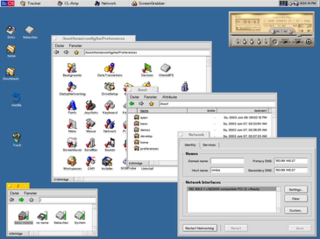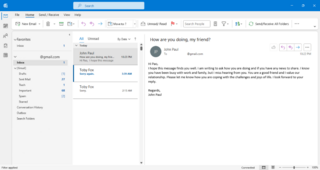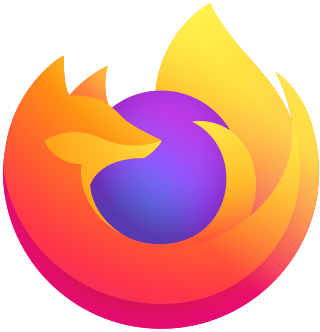
BeOS is a discontinued operating system for personal computers that was developed by Be Inc. It was conceived for the company's BeBox personal computer which was released in 1995. BeOS was designed for multitasking, multithreading, and a graphical user interface. The OS was later sold to OEMs, retail, and directly to users; its last version was released as freeware.

Microsoft Outlook is a personal information manager software system from Microsoft, available as a part of the Microsoft 365 software suites. Though primarily being popular as an email client for businesses, Outlook also includes functions such as calendaring, task managing, contact managing, note-taking, journal logging, web browsing, and RSS news aggregation.

Mozilla Firefox, or simply Firefox, is a free and open source web browser developed by the Mozilla Foundation and its subsidiary, the Mozilla Corporation. It uses the Gecko rendering engine to display web pages, which implements current and anticipated web standards. Firefox is available for Windows 10 and later versions of Windows, macOS, and Linux. Its unofficial ports are available for various Unix and Unix-like operating systems, including FreeBSD, OpenBSD, NetBSD, and other platforms. It is also available for Android and iOS. However, as with all other iOS web browsers, the iOS version uses the WebKit layout engine instead of Gecko due to platform requirements. An optimized version is also available on the Amazon Fire TV as one of the two main browsers available with Amazon's Silk Browser.

Mozilla Thunderbird is a free and open-source email client that also functions as a personal information manager with a calendar and contactbook, as well as an RSS feed reader, chat client (IRC/XMPP/Matrix), and news client. Operated by MZLA Technologies Corporation, a subsidiary of the Mozilla Foundation, Thunderbird is an independent, community-driven project that is managed and overseen by the Thunderbird Council, which is elected by the Thunderbird community. As a cross-platform application, Thunderbird is available for Windows, macOS, FreeBSD, and Linux. The project strategy was originally modeled after that of Mozilla's Firefox, and Thunderbird is an interface built on top of that Web browser.

Eudora is a family of email clients that was used on the classic Mac OS, Mac OS X, and Microsoft Windows operating systems. It also supported several palmtop computing platforms, including Newton and the Palm OS.

Xfire was a proprietary freeware instant messaging service for gamers that also served as a game server browser with various other features. It was available for Microsoft Windows. Xfire was originally developed by Ultimate Arena based in Menlo Park, California.

Miro was an audio, video player and Internet television application developed by the Participatory Culture Foundation. It runs on Microsoft Windows, macOS, FreeBSD and Linux and supports most known video file formats. It offers both audio and video, some in HD quality.
Rainberry, Inc., formerly known as BitTorrent, Inc., is an American company responsible for μTorrent and BitTorrent Mainline. The company was founded on September 22, 2004 by Bram Cohen and Ashwin Navin. It was successful during the Great Recession under the leadership of CEO Eric Klinker. In 2018, the company was acquired by cryptocurrency startup TRON, and Bram Cohen left the company. In March 2022, the SEC charged Rainberry with fraud for selling cryptocurrencies Tronix (TRX) and BitTorrent (BTT) as unregistered securities.

PC Tools', formerly known as WinGuides.com, was a software company acquired by Symantec in 2008; the new owner eventually discontinued the PC Tools name. Company headquarters were in Australia, with offices in Luxembourg, the United States, United Kingdom, Ireland, and Ukraine. The company had previously developed and distributed security and optimization software for the Mac OS X and Microsoft Windows platforms.
The following is a comparison of RSS feed aggregators. Often e-mail programs and web browsers have the ability to display RSS feeds. They are listed here, too.
Apache Cordova is a mobile application development framework created by Nitobi. Adobe Systems purchased Nitobi in 2011, rebranded it as PhoneGap, and later released an open-source version of the software called Apache Cordova. Apache Cordova enables software programmers to build hybrid web applications for mobile devices using CSS3, HTML5, and JavaScript, instead of relying on platform-specific APIs like those in Android, iOS, or Windows Phone. It enables the wrapping up of CSS, HTML, and JavaScript code depending on the platform of the device. It extends the features of HTML and JavaScript to work with the device. The resulting applications are hybrid, meaning that they are neither truly native mobile application nor purely Web-based. They are not native because all layout rendering is done via Web views instead of the platform's native UI framework. They are not Web apps because they are packaged as apps for distribution and have access to native device APIs. Mixing native and hybrid code snippets has been possible since version 1.9.

Sparrow was an email client for OS X and iOS. After a 4-month beta period, Sparrow went on sale in the Mac App Store on February 9, 2011 and became the top paid and top grossing app in less than one day. On July 20, 2012, the company announced that it had been acquired by Google and was ceasing continued development of the application except for critical bug fixes.

BlueStacks is a chain of cloud-based cross-platform products developed by the San Francisco-based company of the same name. The BlueStacks App Player enables the execution of Android applications on computers running Microsoft Windows or macOS.
Firefox was created by Dave Hyatt and Blake Ross as an experimental branch of the Mozilla browser, first released as Firefox 1.0 on November 9, 2004. Starting with version 5.0, a rapid release cycle was put into effect, resulting in a new major version release every six weeks. This was gradually accelerated further in late 2019, so that new major releases occur on four-week cycles starting in 2020.

eM Client is a desktop email client for Windows and macOS. Its functions include sending and receiving email, managing calendars, tasks, contacts, notes, and chat. It was originally released in 2007 and still receives regular updates as of May 2024. Versions for Android and iOS were released in 2024.
Mozilla is a free software community founded in 1998 by members of Netscape. The Mozilla community uses, develops, publishes and supports Mozilla products, thereby promoting exclusively free software and open standards, with only minor exceptions. The community is supported institutionally by the non-profit Mozilla Foundation and its tax-paying subsidiary, the Mozilla Corporation.

Mullvad is a commercial VPN service based in Sweden. Launched in March 2009, Mullvad operates using the WireGuard and OpenVPN protocols. It also supports Shadowsocks as a bridge protocol for censorship circumvention. Mullvad's VPN client software is released under the GPLv3, a free and open-source software license.

Mozilla VPN is an open-source virtual private network developed by Mozilla. It launched in beta as Firefox Private Network on September 10, 2019, and officially launched on July 15, 2020, as Mozilla VPN.










